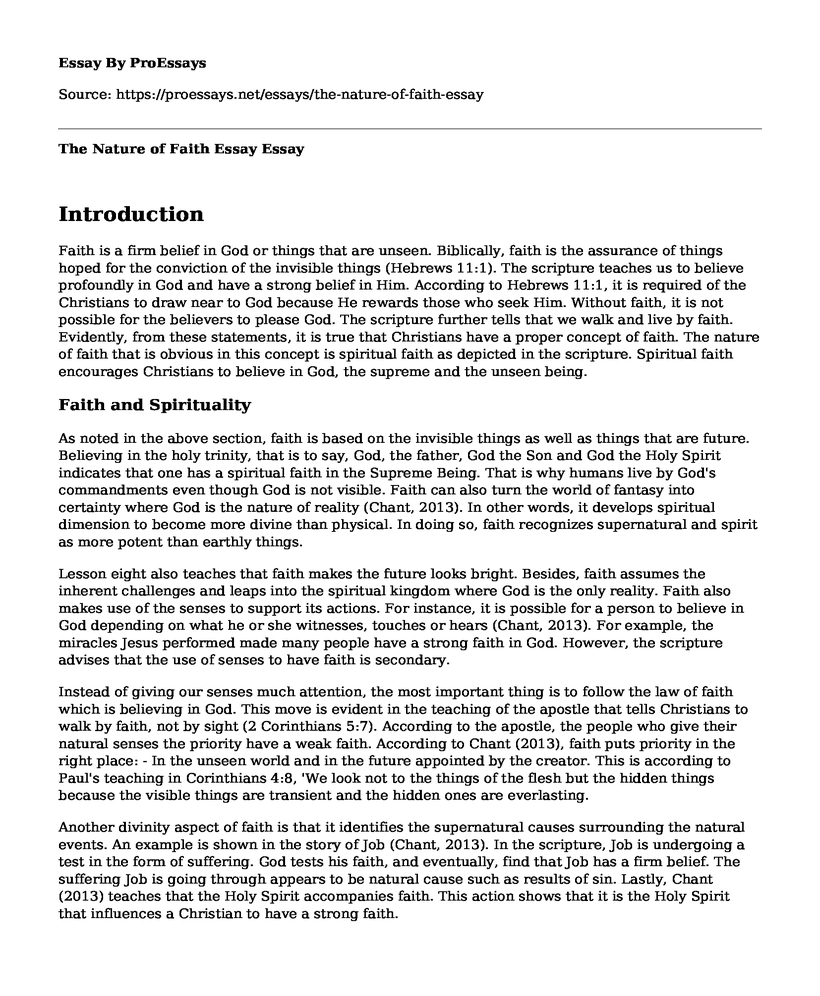Introduction
Faith is a firm belief in God or things that are unseen. Biblically, faith is the assurance of things hoped for the conviction of the invisible things (Hebrews 11:1). The scripture teaches us to believe profoundly in God and have a strong belief in Him. According to Hebrews 11:1, it is required of the Christians to draw near to God because He rewards those who seek Him. Without faith, it is not possible for the believers to please God. The scripture further tells that we walk and live by faith. Evidently, from these statements, it is true that Christians have a proper concept of faith. The nature of faith that is obvious in this concept is spiritual faith as depicted in the scripture. Spiritual faith encourages Christians to believe in God, the supreme and the unseen being.
Faith and Spirituality
As noted in the above section, faith is based on the invisible things as well as things that are future. Believing in the holy trinity, that is to say, God, the father, God the Son and God the Holy Spirit indicates that one has a spiritual faith in the Supreme Being. That is why humans live by God's commandments even though God is not visible. Faith can also turn the world of fantasy into certainty where God is the nature of reality (Chant, 2013). In other words, it develops spiritual dimension to become more divine than physical. In doing so, faith recognizes supernatural and spirit as more potent than earthly things.
Lesson eight also teaches that faith makes the future looks bright. Besides, faith assumes the inherent challenges and leaps into the spiritual kingdom where God is the only reality. Faith also makes use of the senses to support its actions. For instance, it is possible for a person to believe in God depending on what he or she witnesses, touches or hears (Chant, 2013). For example, the miracles Jesus performed made many people have a strong faith in God. However, the scripture advises that the use of senses to have faith is secondary.
Instead of giving our senses much attention, the most important thing is to follow the law of faith which is believing in God. This move is evident in the teaching of the apostle that tells Christians to walk by faith, not by sight (2 Corinthians 5:7). According to the apostle, the people who give their natural senses the priority have a weak faith. According to Chant (2013), faith puts priority in the right place: - In the unseen world and in the future appointed by the creator. This is according to Paul's teaching in Corinthians 4:8, 'We look not to the things of the flesh but the hidden things because the visible things are transient and the hidden ones are everlasting.
Another divinity aspect of faith is that it identifies the supernatural causes surrounding the natural events. An example is shown in the story of Job (Chant, 2013). In the scripture, Job is undergoing a test in the form of suffering. God tests his faith, and eventually, find that Job has a firm belief. The suffering Job is going through appears to be natural cause such as results of sin. Lastly, Chant (2013) teaches that the Holy Spirit accompanies faith. This action shows that it is the Holy Spirit that influences a Christian to have a strong faith.
Conclusion
Overall, the nature of faith exhibited in lesson eight is spiritual. Faith reveals the aspect of reality and discovers its existence. It brings a solid perspective of the divine dimension so that it becomes more celestial than physical. Faith observes the influence that the heavenly world has on the physical world and identifies the mystical causes surrounding natural occurrences. Faith comprehends beyond the natural senses of the spiritual world. It disregards the ordinary thoughts and encourages Christians to believe in heavenly things. Most importantly, faith is accompanied by the Holy Spirit.
References
Chant, K. (2013). Faith Dynamics. Huntsville: Vision Publishing.
Cite this page
The Nature of Faith Essay. (2022, Jun 19). Retrieved from https://proessays.net/essays/the-nature-of-faith-essay
If you are the original author of this essay and no longer wish to have it published on the ProEssays website, please click below to request its removal:
- Full Content Sermon Outline - Course Work Example
- The Nature of Faith Essay
- Relationship Between the Counsellors and the Clients and Spirituality Paper Example
- Essay Sample on Christian Reformers as Heroes
- The Early History of Women and Buddhism Essay
- God's Unconditional Love: Marriage & Homosexuality in Christian Perspective - Essay Sample
- Plato and Proof for God Paper Example







